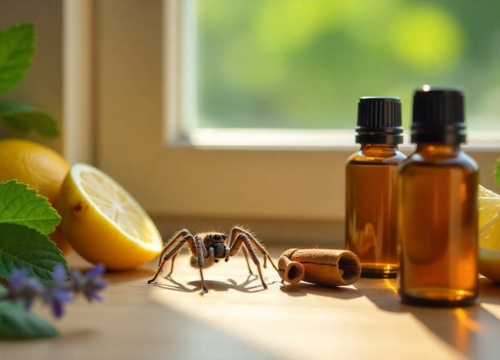Nobody enjoys having spiders wander around their house. Even though spiders help manage other bugs, their presence inside can make many uncomfortable. , nature provides simple methods to keep them away: essential oils. But what smells do spiders avoid? Let’s explore the best scents to keep spiders at bay and ways to create a spider-free space at home!
Why Choose Smells To Keep Spiders Away?
Unlike chemical sprays essential oils provide a safer and eco-friendly option to keep spiders away. Their strong compounds mess with a spider’s sense of smell and make them leave the area.
Advantages of essential oils:
- Safe to use around pets and kids if handled
- Smells nice to humans
- Works as both a spider repellent and an air freshener
- Leaves no harmful chemicals behind

What Scents Keep Spiders Away?
These are the essential oils and smells that spiders dislike the most:
1. Peppermint Oil
Spiders avoid the sharp menthol scent of peppermint.
- Works as a natural bug killer
- Messes with a spider’s sensory system
- Makes your home smell great
Steps to use:
- Add 10 drops of peppermint oil to water in a handheld sprayer
- Spray this mix along corners, window edges, doorframes, and behind large furniture pieces
Click here to explore how peppermint oil keeps insects away
2. Lavender Oil
While people use lavender to relax, it also helps in keeping bugs and spiders away.
- Has linalool and linalyl acetate, which spiders try to avoid
- Can freshen up a room and help you sleep better
Homemade Idea:
- Take a few cotton balls and add a bit of lavender oil.
- Put them inside your drawers, closets, or even near air vents.
3. Tea Tree Oil
Tea tree oil works well because it has antifungal and antiseptic features that spiders dislike.
- Keeps many pests away.
- Cleans floors and keeps bugs from sticking around.
How to use it:
- Mix around 10 drops into a bucket of water and use it to mop.
4. Eucalyptus Oil
The sharp, camphor-like smell of eucalyptus oil makes it great at keeping spiders at bay.
- It sanitizes .
- Diffusing or spraying it works .
Quick tip:
- Put eucalyptus oil in a diffuser to spread its scent across bigger spaces like your living room or office.
5. Citrus Oils (Lemon, Orange Grapefruit)
Spiders hate citrus smells due to limonene, which is a natural way to keep pests away.
- Uplifting scent that feels fresh
- Works to clean, deodorize, and keep spiders at bay
Quick tip:
- You can rub citrus peels straight onto windowsills and baseboards.
- Another option is to mix citrus essential oils in a spray and use that.
Scents That Help Keep Spiders Away:
- Cinnamon – strong and spicy. It keeps spiders and ants away.
- Citronella – mostly known to chase off mosquitoes but also works great on spiders.
- Vinegar – its sharp sour smell pushes spiders away, though it doesn’t smell as nice as oils.
Ways to Use Essential Oils Against Spiders
1. Make a Spider-Repellent Spray
Create your own spider spray by mixing:
- 1 cup of water
- 10–15 drops of an essential oil like peppermint, lavender, or citrus
- 1 teaspoon of white vinegar (if you choose to add it)
Spray this every week in areas like:
- Along baseboards
- Around entry points
- Into cracks and corners
- In attics or basements
2. Using Diffusers
To fill your room with the fragrance, add 5–10 drops of essential oil to a diffuser.
3. Cotton Ball Trick
- Dip some cotton balls in essential oils.
- Put them in hidden or unused spots such as under sinks, behind furniture, or inside closets.
Tips To Stay Safe While Using Essential Oils
- Mix essential oils with a carrier before spraying or applying to surfaces.
- Keep them away from pets and do not let them get in your eyes.
- Test for any allergic reaction or sensitivity on your skin.
How Essential Oils Work: A Look at the Science
Spiders rely on smell to move around and find food. Essential oils release volatile organic compounds (VOCs), which mess with their scent sensors and create an environment they avoid.
Research from National Institutes of Health backs up the bug-repelling abilities of oils like eucalyptus and peppermint.
How to Pick the Best Essential Oils?
Pick oils with these qualities:
- 100% pure and natural ingredients
- No artificial additives
- Stored in dark glass bottles to keep them fresh
If you want oils specifically to repel spiders, explore our natural oil collection designed for great quality and results.
Wrap-Up: Keep Spiders at Bay
So, what smells do spiders dislike? Peppermint, lavender, citrus, eucalyptus, and tea tree oils are some of the top ones. These natural smells keep spiders away and also make your house smell nice.
Essential oils work well as spider repellents. They offer a safe and eco-friendly way to handle the problem, which fits right in with today’s aware lifestyle.











